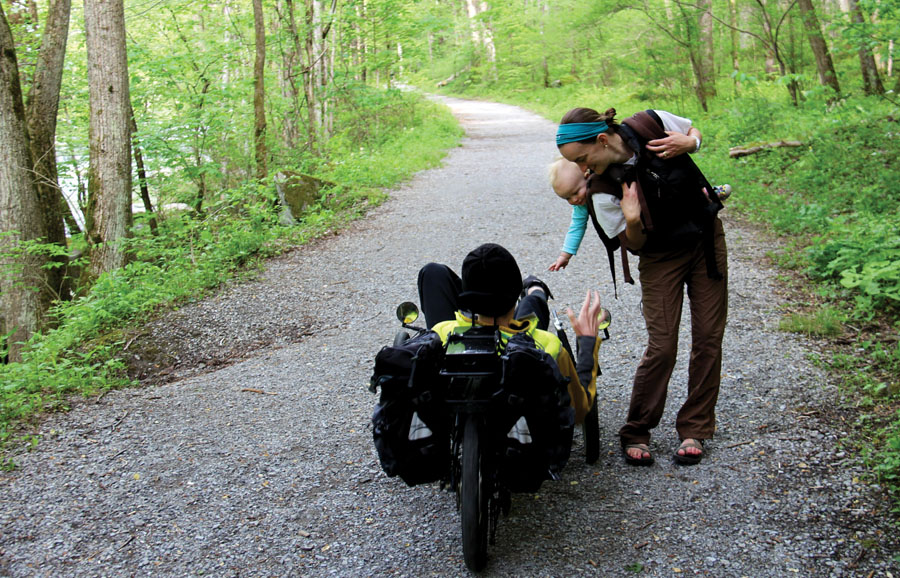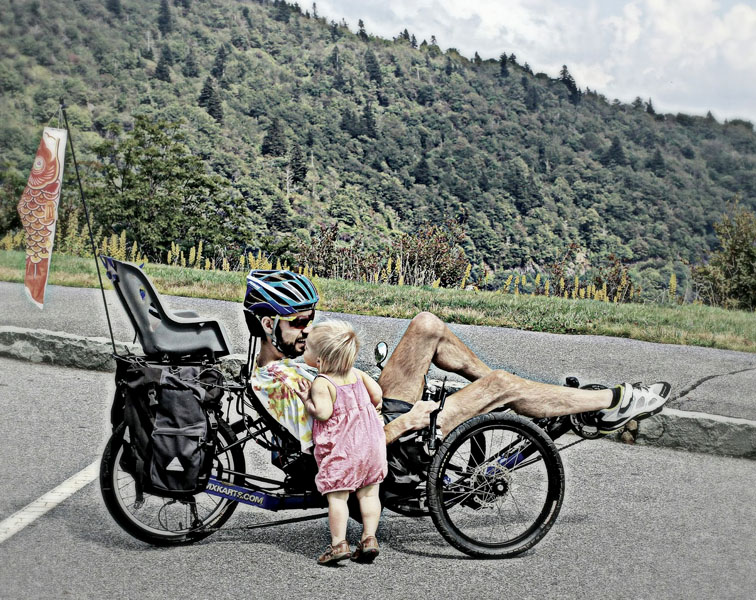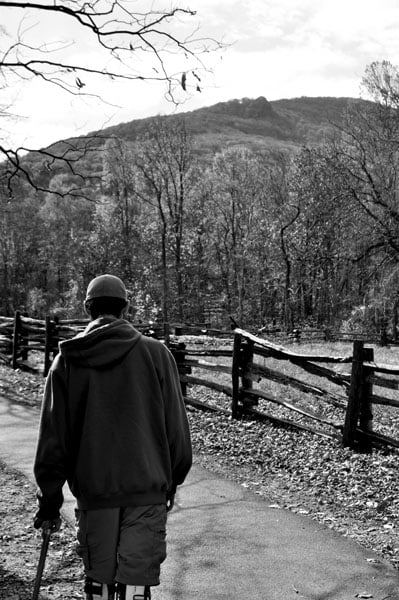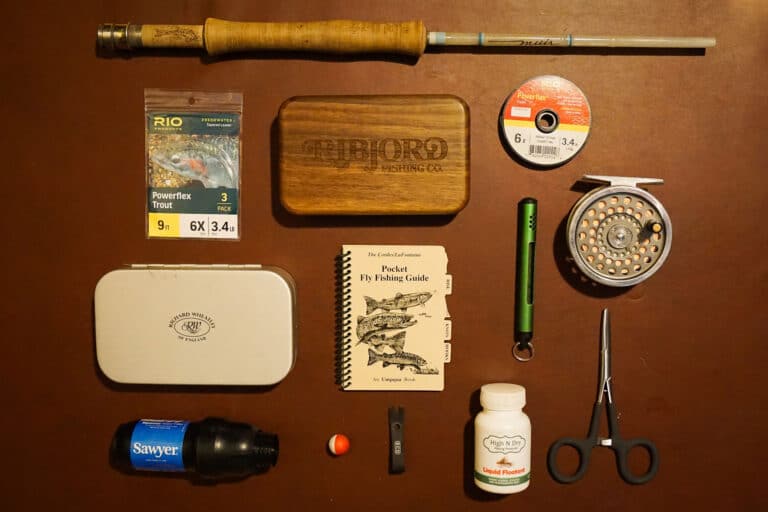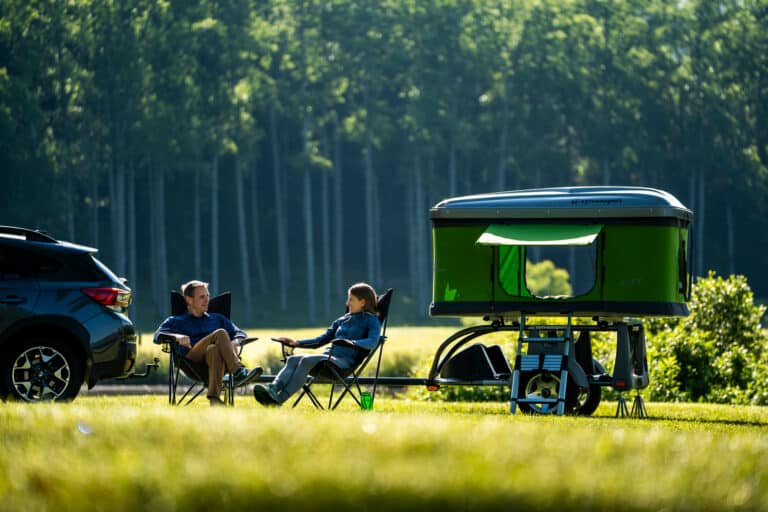Royce will be dead soon. It might be a few years or a few months, but ALS will kill him.
No one knows what causes ALS—Amytrophic Lateral Sclerosis, also known as Lou Gehrig’s Disease. There is no cure.
This story could easily have been mine or yours.
Just five years ago, Royce Cowan was at the top of his game. The 27-year-old was a supreme outdoor adventurer, mountain biker, and elite whitewater paddler who had tackled the Upper West Prong of the Little Pigeon River and contributed photos to a new kayaking guidebook called Whitewater of the Southern Appalachians. On the Tuckasegee River, he had met Natalie Matthews, a kindred adventurous spirit who had just finished nursing school. They dated for a while and eventually got engaged in 2010.
To select a best man, Royce turned an annual summer event into a friendly competition: the first of his friends to float down Nantahala Falls on an inflatable animal and catch Micro Eddy would become best man. His longtime buddy Charles Schmidt, who clung to the neck of a giant inflatable sea dragon through the class III-IV rapid, won the honor.
Three months after marrying Natalie, Royce was diagnosed with ALS.
“It was crushing,” said Natalie. “I was depressed and angry. I thought there was no way he would have ALS at the age of 27. The average patient with ALS is 50 years old. I was angry at the word ‘average.’ I went through a lot of anger and sadness in the beginning, but I didn’t really have time to wallow. There was too much to do.”
First up: get pregnant.
90 percent of ALS is not genetically inherited. Still, there is a risk—a risk they both felt was worth taking.
“I want to keep a part of Royce alive and with me after he is gone,” Natalie said.
Lily is now three years old. Her dad is in a wheelchair, but she still sits on his lap and can understand his slurred speech. She does not know her dad is dying.
Royce has not resigned himself to an early, inevitable death. Instead, he has challenged himself to continue exploring the outdoors for as long as he can. He paddled for a few months after his diagnosis until he could no longer roll.
Then he switched to hiking. He and Natalie trekked nearly 400 miles in Great Smoky Mountains National Park. Hiking in a snowstorm near Mount Cammerer, Royce’s legs failed him, and they had to camp for the night in the middle of a snow-covered trail with only a tarp-tent.
Soon after, Royce turned to recumbent triking. He completed the 52-mile Carolina Ride to Defeat ALS in April and is tackling a 218-mile virtual ride to raise ALS awareness. He also has been coaching Natalie since 2014, helping her to a second place finish in her age group in the North Carolina Triathlon Series.
“Royce pushes himself and those around him to reach for their very best,” says Siara Blackwood, Royce’s sister. “He does not accept what ALS forces on him without doing everything he can to prevent or delay each bit of diminishing ability.”
ALS patients gradually lose the ability to move their muscles, then their speech fails, followed by difficulty breathing and swallowing. The average life expectancy after diagnosis is two to five years.
Five years since his diagnosis, Royce is still alive. He can barely move or speak, but Natalie can understand his slurred utterances. She feeds Royce, bathes him, and lifts him into bed—while also raising Lily and working full-time.
Natalie and Royce are still venturing outdoors together. Royce was able to buy a recumbent electric trike, thanks to donations from friends and from New Orleans Saints football player Steve Gleason, who was diagnosed with ALS in 2011. Accompanied by Natalie, Royce cruises the Blue Ridge Parkway and rural roads near Waynesville on his electric trike.
Royce also has created a foundation to create interest in active ALS events, called Active Reconnect, and he has been blogging about his athletic and everyday experiences with ALS at Journey On with Royce. Below are a few selections from his blog, along with Royce’s responses to four of the hardest questions I’ve ever had to ask.
* * *
What does it feel like on the inside? Do you feel trapped in your body?
My spirit doesn’t feel trapped within my physical body. It rather feels as if it has somehow evolved into a different body altogether—foreign, and yet so vaguely similar.
Imagine being able to feel but incapable of making an appropriate controlled response. An insect lands on your forehead. Typically your brain would receive the information and send a message through your nervous system, activating a group of muscles to bat the bug off with your hand. In my case, the same series of events occurs, except my hand doesn’t move. I’m left to my own devices; I can call for help or bang my head on something. People with ALS never lose any sensation over the duration of the disease process. I have all of my senses and everything that comes with them.
In fact, most times I feel quite normal. When I’m cruising down the parkway on my recumbent electric trike, I’m nearly in a blissful state of my formal self. When I pedal or turn the throttle, I move forward. When I turn left, I move left. When I brake, I slow down. My actions create an actual response. And that, to me, is freedom.
How do you stay positive?
Staying positive is a huge challenge for me. Every single person I know realizes my fate. As the disease progresses, people come by to see me less and less. Perhaps it’s too painful for them to see me in my condition, or maybe they just start to find me boring. Once I started to noticeably change, people became scarce. With the exception of a few really amazing folks, most don’t make the effort. That is something that can tear you up inside. You simply can’t dwell on it though or that feeling of abandonment will drag you down and push you to the grave more quickly.
To truly stay positive you need purpose in your life. Everyone seems to think getting into a fancy power chair and going on little outings will fill that empty void in your life, but it won’t; at least not for me. I need to strive for a higher purpose—something bigger than myself or even my family. There are millions of lives affected by ALS and millions more to come. I suffer on a daily basis for them. But I am staying positive until the bitter end because it is my belief that is my earthly duty to do so.
What do you want Lily to remember about you?
A year or so after my diagnosis, my closest friends held a weekend gathering for me. During this time, I mainly sat and listened to classic stories from our adventurous days, including a trip to Cozumel, Mexico, where I challenged a 220-pound Native American to a tequila contest. The result: an inglorious draw.
As I sat and listened, I realized in the way they were telling the highlights that I was already dead to them. I was attending my own memorial. And the most interesting aspect of it all was that they were right. The man I once was would be ever lost to this disease. My daughter would never know the full-throttle version of me—the young guy who couldn’t sit still, who thought nothing of waking up at 4:30 a.m. to get three separate solo creeking runs in during January, just because the water was up in the Smokies.
To survive, a rebirth needed to take place. The man I want Lily to remember is one that didn’t hold her back out of selfishness, but rather one that strived to provide her with an opportunity to grow and experience life to its full potential.
Selections from
Journey on with Royce
How do you fight back against one of the most deadly neurological diseases in the world? There are no cures, no real treatments, no guidebooks to advise you what to do once you realize just how utterly screwed you are. Being diagnosed with ALS is a terrifying experience. All your doctor says are three simple letters. Unfortunately those letters translate into: “I’m going to die.” How the hell did this happen? Yesterday my knee was annoying me; today I’m going to die? Being given this news is like getting your foot stuck in a railroad track and someone saying, “See that train down there? It’s coming and there’s nothing you can do about it. Care for a chair?”
When I was first diagnosed, I wanted to wriggle my foot out of that track more than anything. Turns out it’s stuck pretty good, though. Once you develop ALS, it’s there to stay. So what can I do? I’m trying to slow down that death train. I give my body exercise, energy, and rest. I get outdoors. I am fighting back by being as healthy as I possibly can.
It seems to be working. Since being diagnosed, I’ve become a father, hiked half of the trails in the Great Smokies, rode 1,000 miles on my recumbent trike, created a garden and hand-dug a koi pond, and best of all, I haven’t died yet, five years in. I’ve already beaten the odds.
* * *
When we decided that we would try to have a baby despite my condition, we didn’t take the decision lightly. We knew that it would mean that our lives would get more complicated, but we also knew our lives would become more meaningful as well.
Before our daughter was born, I would practice changing diapers on an old stuffed teddy bear. I wanted to be able to help out as much as I could with our new baby. Since our daughter was born, I have changed zero diapers. It’s not that I don’t want to; it’s just that I can’t. I can’t do a lot of things with my daughter. I can’t give her baths, change her clothes, pick her up when she falls. I can’t carry her around the house or push her stroller around the block.
But I don’t wish for pointless wishes. When someone picks up our daughter and spins her around a room, making her laugh, I don’t spend any of my time wishing I could do the same. I’m just happy for her.
* * *
A typical day for me goes a little something like this:
I wake up and call the nurse into my room by making a yelling noise or by using a walkie-talkie. The nurse has to help move my legs off the bed and help sit me up. Once I’m sitting up, I have my morning pills with apple juice. Then we transfer to the shower chair and I roll into the bathroom.
During my shower I brush my teeth and pee. After I’m through doing this, I call the nurse by tapping my wedding ring on the handrail. At that point the nurse will come in to wash my face, hair, and body. After my nurse dries me off, she puts on my deodorant, shirt, and glasses and transfers me to the wheelchair.
I eat breakfast, which typically is an egg sandwich in a pita. I work on the computer using a special screen for typing. In the afternoon, I watch a show or sleep. If Lily is at home, sometimes she will lie with me and I will pick a movie for her.
When Natalie comes home, we have dinner and maybe watch a show. I head to the bedroom around 8:30, just after Lily goes to bed for the night.
* * *
When our daughter Lily was born, I could still walk and talk. Time moves forward though, and so does ALS. Lily knows that I am different from other people, but it is just normal for her. Every once in a while, she will do something that makes you realize she’s not fully aware of my disability. For instance, she often pounces on me in bed, which is fine, but sometimes she tries to do the same when I’m sitting up. This just knocks me over. She also has asked me to do things I can’t do, like throw a ball. For the most part, she is aware of what I can and cannot do.
It would be so easy to cry about the things or times that could have been. I would have loved to teach my daughter how to swim, play softball, soccer, climb, kayak, ski. I won’t even be able to teach her how to talk. But that doesn’t matter really. Our daughter is still going to have an amazing life, and I plan on being a big part of it any way I can, for as long as I can.
